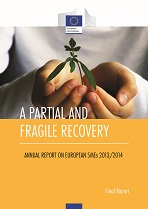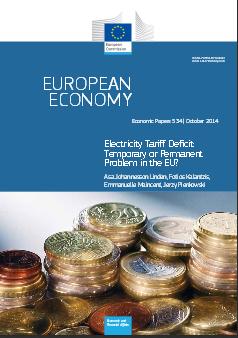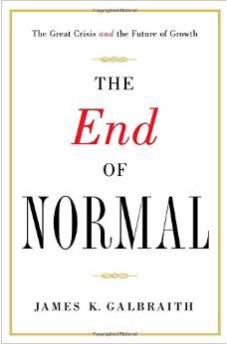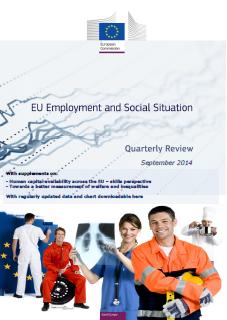European Commission, “Annual Report on European SMEs 2013/2014: A Partial and Fragile Recovery“, Final Report – July 2014, SME Performance Review 2013/2014. The SME Performance Review is one of the main tools the European Commission uses to monitor and assess countries’ progress in implementing the Small Business Act (SBA) on a yearly basis. With an emphasis on the measures from the SBA Action Plan, the review brings comprehensive information …Read More
Systemic equilibrium in a Bretton Woods II-type international monetary system: the special roles of reserve issuers and reserve accumulators
Austin, Κ. (2014) “Systemic equilibrium in a Bretton Woods II-type international monetary system: the special roles of reserve issuers and reserve accumulators“, Journal of Post Keynesian Economics, 2014, vol. 36, issue 4, pages 607-634. This article develops a model, based on balance-of-payment identities, of the new international monetary system (Bretton Woods II or BWII). It shows that if some countries engineer current account surpluses by exchange-rate manipulation and foreign-reserve …Read More
Electricity Tariff Deficit: Temporary or Permanent problem in the EU?
Johannesson Linden, Α., Kalantzis, F., Maincent, E. & Pienkowski, J. (2014) “Electricity Tariff Deficit: Temporary or Permanent problem in the EU?“, European Economy. Economic Papers. 534. October. In the recent years electricity tariff deficits emerged in Spain, Portugal, Greece and in some other Member States. Tariff deficits are shortfalls of revenues in the electricity system, which arise when the tariffs for the regulated components of the retail electricity price …Read More
The End of Normal: The Great Crisis and the Future of Growth
Galbraith, J. K., The End of Normal: The Great Crisis and the Future of Growth, Simon and Shuster, New York: September 2014. The years since the Great Crisis of 2008 have seen slow growth, high unemployment, falling home values, chronic deficits, a deepening disaster in Europe—and a stale argument between two false solutions, “austerity” on one side and “stimulus” on the other. Both sides and practically all analyses of …Read More
The German experiment has failed
Mitchell, B. (2014) “The German experiment has failed“, Mainly Macro Blog, 07 October. In the last week, several new data releases have shown that the Eurozone crisis is now consolidating in the core of Europe – France, Italy and … yes, Germany. The latter has forced nonsensical austerity on its trading partners in the monetary union. And, finally, the inevitable has happened. Germany’s factories are now in decline because …Read More
EU Employment and Social Situation – Quarterly Review
European Commission (2014) EU Employment and Social Situation – Quarterly Review, Social Europe, Publications Office of the European Union: September 2014, 06 October. Monitoring of the labour market and the social situation The EU Employment and Social Situation Quarterly Review gives an overview of recent developments in the European labour market and social situation, including short-term changes in GDP and employment growth, in employment and unemployment rates, and in …Read More
Eurostat Regional Yearbook 2014
Kotzeva, M. (Ed.) (2014) Eurostat Regional Yearbook 2014, Eurostat Publications, October. Statistical information is an important tool for understanding and quantifying the impact of political decisions in a specific territory or region. The Eurostat regional yearbook 2014 gives a detailed picture relating to a broad range of statistical topics across the regions of the Member States of the European Union (EU), as well as the regions of EFTA and …Read More
Eurozone Asymmetries
Wren-Lewis, S. (2014) “Eurozone Asymmetries“, Mainly Macro Blog, 05 October. Suppose a large Eurozone country – let’s call it France – decided that it needs to substantially increase its minimum wage in order to reduce poverty. The increase is sufficiently large that it leads to a sustained increase in average French wage inflation, which in turn decreases the competitiveness of France relative to the rest of the Eurozone. France …Read More
Economists Are Blind to the Limits of Growth
Buchanan, M. (2014) “Economists Are Blind to the Limits of Growth“, Bloomberg View, 05 October. For all their calculating nature, economists are surprisingly optimistic about humanity’s ability to have as much prosperity as it wants. Express concern about the negative impact of excessive growth on our planet’s ecosystems, and many will simply chuckle and say you don’t understand what growth means. Nobel laureate Paul Krugman, for example, chides natural …Read More
The Effects of a Money-Financed Fiscal Stimulus
Galí, J. (2014) “The Effects of a Money-Financed Fiscal Stimulus“, Centre for Economic Policy Research, 24 September. I analyze the effects of an increase in government purchases financed entirely through seignorage, in both a classical and a New Keynesian framework, and compare them with those resulting from a more conventional debt-financed stimulus. My findings point to the importance of nominal rigidities in shaping those effects. Under a realistic calibration …Read More









